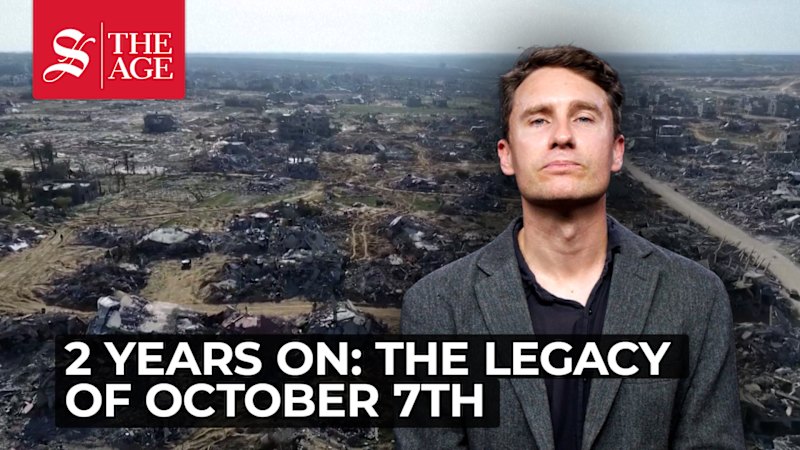
News
October 07, 2025
2 years on: The legacy of October 7th
It has been 2 years since the October 7th attacks in Israel. Foreign Affairs Correspondent Matthew Knott reflects on the ongoing impacts of that day in 2023.
Two years after the devastating October 7th attacks in Israel, the ramifications continue to reverberate across the region and the world. Foreign Affairs Correspondent Matthew Knott offers a somber assessment of the lasting legacy of that day in 2023, a day that irrevocably altered the political landscape and personal lives of countless individuals.
Knott emphasizes that the immediate aftermath of the attacks, the immense loss of life and the sheer brutality witnessed, left an indelible scar on the Israeli psyche. The sense of security that many had taken for granted was shattered, replaced by a deep-seated vulnerability and a renewed focus on national defense. This heightened sense of insecurity, he argues, continues to shape Israeli policy and public opinion.
Beyond the immediate human cost, Knott highlights the profound impact on international relations. The attacks ignited a complex and multifaceted conflict that has drawn in global powers and further polarized opinions on the Israeli-Palestinian conflict. He points to the increased scrutiny of Israel's military actions and the growing international pressure for a lasting resolution to the long-standing issues at the heart of the conflict.
The economic consequences, both direct and indirect, are also a significant part of the legacy. Knott notes the disruption to various sectors, including tourism and trade, and the immense financial burden of military operations and reconstruction efforts. The attacks also exposed vulnerabilities in Israel's security infrastructure, leading to significant investments in improving defense capabilities.
Furthermore, Knott delves into the long-term psychological impact on both Israelis and Palestinians. The trauma experienced by survivors, the grief of bereaved families, and the widespread fear and anxiety have created a mental health crisis that will require sustained attention and resources for years to come. The events of October 7th, he stresses, have deepened existing divisions and fueled cycles of violence, making reconciliation and lasting peace even more challenging to achieve.
In conclusion, Knott's reflection on the two-year anniversary underscores the enduring and multifaceted legacy of the October 7th attacks. It serves as a stark reminder of the human cost of conflict and the urgent need for renewed efforts towards a peaceful and just resolution. The path forward, he suggests, requires acknowledging the pain and suffering on all sides, addressing the root causes of the conflict, and fostering a genuine commitment to dialogue and mutual understanding.
Knott emphasizes that the immediate aftermath of the attacks, the immense loss of life and the sheer brutality witnessed, left an indelible scar on the Israeli psyche. The sense of security that many had taken for granted was shattered, replaced by a deep-seated vulnerability and a renewed focus on national defense. This heightened sense of insecurity, he argues, continues to shape Israeli policy and public opinion.
Beyond the immediate human cost, Knott highlights the profound impact on international relations. The attacks ignited a complex and multifaceted conflict that has drawn in global powers and further polarized opinions on the Israeli-Palestinian conflict. He points to the increased scrutiny of Israel's military actions and the growing international pressure for a lasting resolution to the long-standing issues at the heart of the conflict.
The economic consequences, both direct and indirect, are also a significant part of the legacy. Knott notes the disruption to various sectors, including tourism and trade, and the immense financial burden of military operations and reconstruction efforts. The attacks also exposed vulnerabilities in Israel's security infrastructure, leading to significant investments in improving defense capabilities.
Furthermore, Knott delves into the long-term psychological impact on both Israelis and Palestinians. The trauma experienced by survivors, the grief of bereaved families, and the widespread fear and anxiety have created a mental health crisis that will require sustained attention and resources for years to come. The events of October 7th, he stresses, have deepened existing divisions and fueled cycles of violence, making reconciliation and lasting peace even more challenging to achieve.
In conclusion, Knott's reflection on the two-year anniversary underscores the enduring and multifaceted legacy of the October 7th attacks. It serves as a stark reminder of the human cost of conflict and the urgent need for renewed efforts towards a peaceful and just resolution. The path forward, he suggests, requires acknowledging the pain and suffering on all sides, addressing the root causes of the conflict, and fostering a genuine commitment to dialogue and mutual understanding.
Category:
World